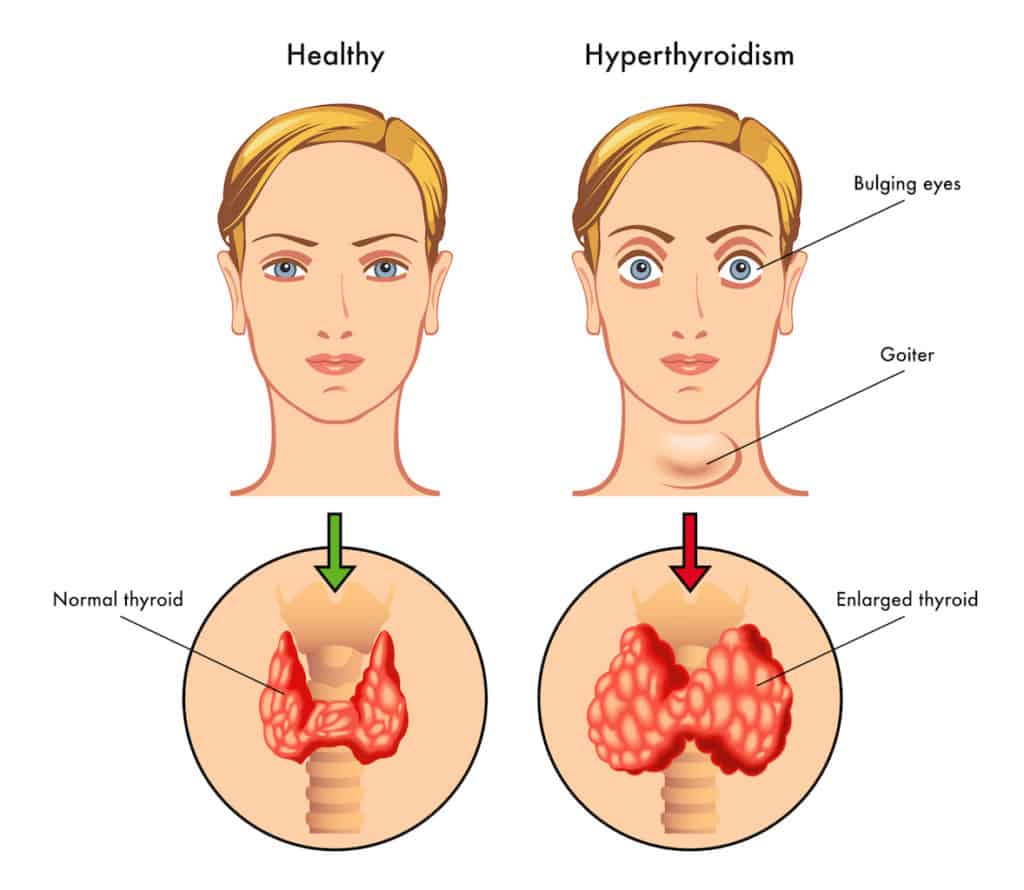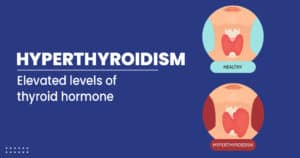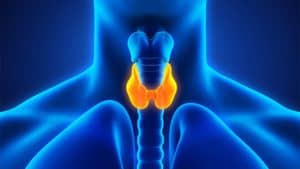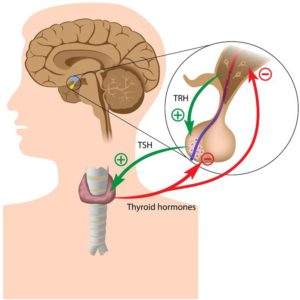Hyperthyroidism is a medical condition that occurs when the thyroid gland produces excessive thyroid hormone. This can lead to a wide range of symptoms, including weight loss, anxiety, and rapid heartbeat, among others. The hyperthyroidism diagnosis is made through a combination of physical examination, blood tests, and imaging studies. Hyperthyroidism treatment(overactive thyroid treatment) includes medication, radioactive iodine therapy, and surgery, with the choice of Hyperthyroidism treatment depending on the severity of the condition, the age of the patient, and other factors. In this article, we will explore the various methods used to diagnose and treat hyperthyroidism.
Diagnosis of Hyperthyroidism
The hyperthyroidism diagnosis involves a thorough evaluation of the patient’s symptoms and physical examination, along with laboratory tests to measure the levels of thyroid hormones and other related markers. The most common laboratory test used to diagnose hyperthyroidism is a thyroid function test, which measures the levels of thyroid-stimulating hormone (TSH), triiodothyronine (T3), and thyroxine (T4) in the blood.
In cases where TSH levels are low and T3 and T4 levels are high, a hyperthyroidism diagnosis is likely. Other tests that may be used to diagnose hyperthyroidism include a radioactive iodine uptake test, which measures how much iodine the thyroid gland can absorb, and an ultrasound or CT scan to evaluate the size and shape of the thyroid gland. Get a better understanding with Hyperthyroid- Meaning, Symptoms & Causes.
In some cases, a fine-needle biopsy may also be performed to rule out the possibility of thyroid cancer. Overall, the hyperthyroidism diagnosis requires a comprehensive evaluation by a healthcare professional and may involve multiple tests to confirm the hyperthyroidism diagnosis and identify the underlying cause of the condition.
Some common symptoms of hyperthyroidism include:
- Weight loss: Despite an increased appetite, individuals with hyperthyroidism may experience unexplained weight loss.
- Rapid heartbeat: The increased metabolic rate associated with hyperthyroidism can cause the heart to beat faster than normal, which can lead to palpitations or irregular heart rhythms.
- Anxiety and nervousness: Hyperthyroidism can cause an increase in anxiety, fear, and irritability.
- Tremors: Hand tremors or shakiness may occur due to increased nervous system activity.
- Fatigue: Despite having a high metabolic rate, individuals with hyperthyroidism may experience fatigue and weakness.
- Heat intolerance and excessive sweating: Hyperthyroidism can cause increased sweating and intolerance to heat.
- Changes in the menstrual cycle: Women with hyperthyroidism may experience changes in their menstrual cycle, including lighter or infrequent periods.
- Enlarged thyroid gland: A goiter or an enlarged thyroid gland may be present in some cases of hyperthyroidism.
It is important to note that not all individuals with hyperthyroidism experience all of these symptoms, and the severity of symptoms may vary depending on the individual and the underlying cause of the condition. If you are experiencing any of these symptoms, it is essential to talk to a healthcare professional for proper hyperthyroidism diagnosis and Hyperthyroidism treatment(overactive thyroid treatment). Learn more about this in detail with our Thyroid Blogs.
Treatment of Hyperthyroidism
Hyperthyroidism is caused by an overactive thyroid gland that produces too much thyroid hormone. There are several possible causes of hyperthyroidism, including:
- Graves’ disease: This autoimmune disorder is the most common cause of hyperthyroidism, accounting for up to 80% of cases. Graves’ disease occurs when the body produces antibodies that stimulate the thyroid gland to produce excessive amounts of thyroid hormone.
- Thyroid nodules: Nodules or lumps on the thyroid gland can become overactive and produce excessive thyroid hormone, leading to hyperthyroidism.
- Thyroiditis: Inflammation of the thyroid gland, which can be caused by a viral infection or an autoimmune disorder, can lead to the release of excess thyroid hormone.
- Excessive iodine intake: Consuming too much iodine, whether through Thyroid Diet Plan or medication, can cause the thyroid gland to produce too much thyroid hormone.
- Pituitary gland problems: Rarely, hyperthyroidism can be caused by a pituitary gland tumor that produces too much thyroid-stimulating hormone (TSH), which stimulates the thyroid gland to produce excessive thyroid hormone.
- Medications: Certain medications, such as amiodarone or lithium, can cause hyperthyroidism.
Hyperthyroidism treatment(overactive thyroid treatment) depends on the underlying cause of the condition, the severity of symptoms, and the age and overall health of the patient.
Some common Hyperthyroidism treatment(overactive thyroid treatment) include:
- Medications: Antithyroid medications, such as methimazole or propylthiouracil, can be used to block the production of thyroid hormones and alleviate symptoms of hyperthyroidism. Beta-blockers may also be prescribed to control rapid heart rate and other symptoms.
- Radioactive iodine therapy: This Hyperthyroidism treatment involves the administration of radioactive iodine, which is taken up by the thyroid gland and destroys the overactive thyroid cells. This treatment is usually reserved for patients with severe hyperthyroidism or who have failed other treatments.
- Surgery: Thyroidectomy or the surgical removal of the thyroid gland may be recommended for patients with large goiters or those who do not respond to other treatments. This Hyperthyroidism treatment requires lifelong thyroid hormone replacement therapy.
- Supportive care: In addition to medical treatments, supportive care such as rest, proper nutrition, and stress reduction techniques may help alleviate symptoms of hyperthyroidism.
It is important to note that each Hyperthyroidism treatment option has its own benefits and risks, and the choice of treatment depends on the individual case. Regular follow-up with a healthcare professional is important to monitor thyroid hormone levels and adjust treatment as needed.
Home Remedies & Lifestyle Tips to treat Hyperthyroidism
While medical treatments are often necessary for managing hyperthyroidism, there are also some home remedies and lifestyle tips that may help alleviate symptoms and improve overall health. It is important to note that these remedies should not replace medical treatment but can be used in conjunction with medical care.
- Reduce stress: Stress can exacerbate symptoms of hyperthyroidism, so practicing stress-reduction techniques such as yoga, meditation, or deep breathing exercises may help manage symptoms.
- Exercise regularly: Regular exercise can help improve overall health and alleviate symptoms of hyperthyroidism. However, it is important to talk to a healthcare professional before starting a new exercise program.
- Eat a healthy diet: Eating a balanced diet with Thyroid Recipes that includes lean protein, fruits and vegetables, and whole grains can help support overall health and provide essential nutrients.
- Avoid iodine-rich foods: Consuming large amounts of iodine, such as seaweed or iodine supplements, can exacerbate hyperthyroidism symptoms.
- Limit caffeine and alcohol: Caffeine and alcohol can worsen symptoms such as palpitations and anxiety, so it is best to limit or avoid these substances.
- Get enough rest: Adequate rest is important for managing hyperthyroidism symptoms and supporting overall health.
- Support eye health: In cases where hyperthyroidism has caused eye problems, using lubricating eye drops and wearing sunglasses may help alleviate discomfort.
It is important to talk to a healthcare professional before trying any home remedies or lifestyle tips for hyperthyroidism, as some remedies may interact with medications or worsen symptoms.
The Bottom Line
Hyperthyroidism is a condition in which the thyroid gland produces too much thyroid hormone, leading to a range of symptoms including weight loss, rapid heartbeat, and anxiety. The condition can be caused by factors such as Graves’ disease, thyroid nodules, or excessive iodine intake. Hyperthyroidism treatment(overactive thyroid treatment) options include medications, radioactive iodine therapy, surgery, and supportive care. In addition to medical treatment(hyperthyroidism cure), lifestyle modifications such as stress reduction techniques, regular exercise, and a balanced diet may help alleviate symptoms of hyperthyroidism. It is important to talk to a healthcare professional for proper hyperthyroidism diagnosis and Hyperthyroidism treatment(hyperthyroidism cure) and to discuss any home remedies or lifestyle tips before trying them.
FAQs
How can I cure Hyperthyroidism Naturally?
While there are some home remedies and lifestyle modifications that may help alleviate symptoms of hyperthyroidism, it is important to note that there is no known natural cure for hyperthyroidism. The condition is typically managed through medical treatment such as medications, radioactive iodine therapy, or surgery.
That being said, some natural remedies and lifestyle modifications may help support overall health and improve symptoms. These include:
- Eating a balanced diet that includes lean protein, fruits and vegetables, and whole grains.
- Limiting or avoiding caffeine and alcohol.
- Managing stress through techniques such as yoga, meditation, or deep breathing exercises.
- Getting regular exercise, but discussing any new exercise routine with a healthcare professional first.
- Getting adequate rest and sleep.
- Avoiding iodine-rich foods, such as seaweed or iodine supplements.
- Supporting eye health through the use of lubricating eye drops and wearing sunglasses.
It is important to talk to a healthcare professional before trying any natural remedies or lifestyle modifications, as some may interact with medications or worsen symptoms. In some cases, medical treatment(hyperthyroidism cure) may still be necessary to manage hyperthyroidism.
What is the Best Treatment for Hyperthyroidism?
The best Hyperthyroidism treatment depends on several factors, including the underlying cause of the condition, the severity of symptoms, and the patient’s age and overall health. Treatment options for hyperthyroidism(hyperthyroidism cure) include:
- Antithyroid medications: These medications, such as methimazole or propylthiouracil, can help block the production of thyroid hormones and alleviate symptoms. They are typically prescribed for patients with mild to moderate hyperthyroidism.
- Radioactive iodine therapy: This Hyperthyroidism treatment involves the administration of radioactive iodine, which is taken up by the thyroid gland and destroys the overactive thyroid cells. This Hyperthyroidism treatment(hyperthyroidism cure) is typically reserved for patients with severe hyperthyroidism or who have failed other treatments.
- Surgery: Thyroidectomy or the surgical removal of the thyroid gland may be recommended for patients with large goiters or those who do not respond to other treatments. This Hyperthyroidism treatment(hyperthyroidism cure) requires lifelong thyroid hormone replacement therapy.
- Beta-blockers: These medications can help control symptoms such as rapid heart rate and tremors. They are typically used as a short-term Hyperthyroidism treatment(hyperthyroidism cure) while other treatments take effect.
The choice of Hyperthyroidism treatment(hyperthyroidism cure) depends on the individual case, and the decision is typically made by a healthcare professional after a thorough evaluation of the patient’s condition. Regular follow-up with a healthcare professional is important to monitor thyroid hormone levels and adjust treatment(hyperthyroidism cure) as needed.
Can Hyperthyroidism be cured completely?
In many cases, hyperthyroidism can be effectively treated and managed, but there is no known cure for the condition. The goal of treatment(hyperthyroidism cure) is typically to control the overproduction of thyroid hormones, alleviate symptoms, and prevent complications. With proper medical treatment and Thyroid Management, many people with hyperthyroidism are able to live healthy, normal lives.
In some cases, hyperthyroidism may go into remission or resolve on its own. Particularly in cases of subacute thyroiditis or postpartum thyroiditis. However, it is important to note that the condition may also recur in these cases.
Regular follow-up with a healthcare professional is important to monitor thyroid hormone levels and adjust treatment(hyperthyroidism cure) as needed. With proper management, most people with hyperthyroidism are able to maintain good health and quality of life.
Can Hyperthyroidism be cured by Exercise?
While regular exercise can have many health benefits, there is no evidence to suggest that exercise alone can cure hyperthyroidism. Hyperthyroidism is a medical condition that requires proper hyperthyroidism diagnosis and hyperthyroidism cure by a healthcare professional.
That being said, regular exercise can help support overall health. May help alleviate some symptoms of hyperthyroidism, such as anxiety or restlessness. Exercise can also help support healthy weight management, which can be a challenge for some people with hyperthyroidism.
It is important to talk to a healthcare professional before starting a new exercise routine, particularly if you have hyperthyroidism. They can help guide you on the best types and amounts of exercise for your specific needs and condition. Exercise alone is not a substitute for medical treatment for hyperthyroidism.









